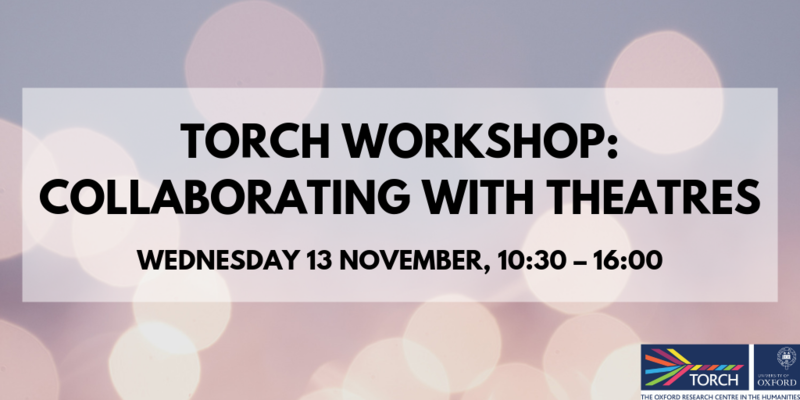Collaborating with Theatres Workshop
What if it were possible to act out the ethical challenges facing medical research with in an immersive theatre experience? Are there theatrical aspects to be uncovered in the crafting of steel? And how might a play about big data be used in the future?
These and other outside-the-box questions were the starting point of “Collaborating with Theatres”, an innovative TORCH workshop at St Luke’s Chapel, whose aim was to inspire attendees to propose and secure funding for their own collaborative projects. Theatre practitioners, Oxford researchers, Theatres Seed Fund awardees and workshop attendees came together to explore a variety of past and on-going “practice-as-research” theatre collaborations and, most importantly, talk about the ins and outs of putting your research on stage. Over the course of the engaging event, one could not help but share one sentiment: theatre is communicating something, and that something can be an artistic vision, theatrical knowledge, academic knowledge or all of those symbiotically combined. When the academic collides with the theatrical, this clash can make for the most surprising and enriching experience – if you know how to go about it.
The first panel session of the day, featuring theatre practitioners Lucy Askew (Creation Theatre), Anja Meinhardt (Justice in Motion), and Nathan Grassi/Ida Persson (actREAL), showcased how collaborations with researchers come to be and highlighted what the most common challenges for a successful partnership are. Lucy, who had worked with Prof Marion Turner (English) on the multiple-venue Oxford staging of The Canterbury Tales, emphasised that researchers are the strongest advocate for their respective fields of research and should thus reach out to theatre companies with concrete project ideas. Anja opined that it is then of the utmost importance to establish how much freedom the theatre makers have to make the collaborative production their own piece.
Key is to inspire and be inspired: it is about the people you are engaging with. What works best for you might not work for your collaborator. It is thus of great significance to clearly establish whose domain is whose. Good news for the researchers and theatre companies alike: results of cooperative efforts and audience responses to pieces often “directly feed back into the main researcher’s work” (Anja Meinhardt), whereas post-show discussions and talks help enhance the theatre experience.
The afternoon’s researcher panel showcased collaborative projects of Oxford researchers: Prof Wes Williams (Medieval and Modern Languages), Prof Kirsten Shepherd-Barr (English), and Dr Beth Greenhough (Geography and Environment) with Dr Bentley Crudgington (Medical Sciences, University of Manchester). Be it a Brexit-infused exploration of Thomas Moore’s Utopia, a night of medical history and drama, or the exploration of the ethics of medical research scenarios, Wes pointedly summarised what the draw of theatre to is researchers: collaborative research helps you find out which aspects of your research translate to an audience or not. If you want your research to be transformed by theatre and vice versa, you must commit to investing time and headspace. Bentley further remarked that despite the personal efforts of all parties involved, theatre collaborators are often confronted with the major challenge of having to provide tangible outcomes of their projects. Very few artists create with the concept of evaluation and measuring impact at the forefront of their artistic vision. But both theatre companies and researchers have impact and increasingly aim to show this more clearly. TORCH’s Evaluation and Impact Officer Charlotte Medland encouraged attendees and speakers alike to think about one of the most pressing questions right at the start of their collaborative work: What do you want the legacy of your project to be? Evaluation can help you to move projects forward and provide you with tangible proof of the success of your collaborative project.
The concluding roundtable with 2019 Seed Fund Awardees Prof Suzanne Aspden (Music), Dr George Busby (Medicine), Hannah Greenstreet (English) and Dr Pete Hommel (Archeology) further highlighted that immersion is increasingly becoming a vital component in research funding. Academic knowledge and the process of its production is maybe inherently theatrical: it is about bringing the process to an audience that could normally not experience it (Pete). It is about enjoying but also about documenting and evidencing this experience.
Theatre is widely recognised as a way of both eliciting emotional responses and prompting its audience to re-think established paradigms. To all you researchers out there: Don’t be scared to approach your local theatre company. Your enthusiasm and their expertise could be the starting point of a fantastic journey for both you and your audience.



